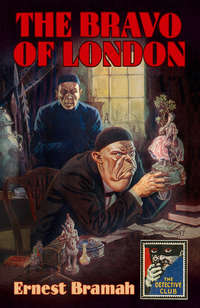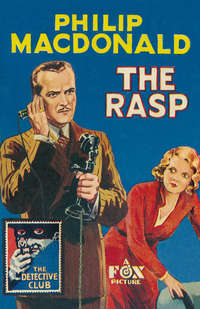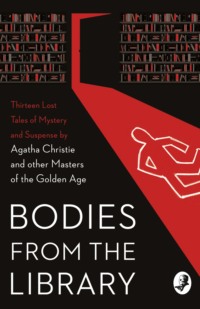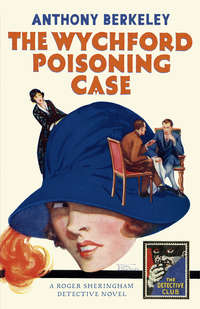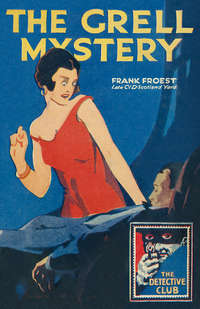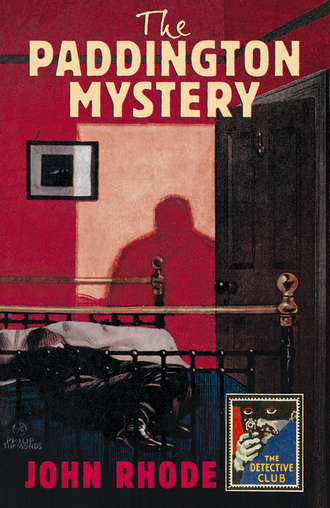
Полная версия
The Paddington Mystery
He leapt from his chair, stood for a moment as though balancing himself on a narrow ledge, then sank back once more, dispirited. What was the use? Who cared what he did? April was beyond his reach, Vere had chucked him, the fire in the untidy grate was out long ago. There was nothing for it but to go to bed.
Very deliberately, as though embarking upon an undertaking which required skill and concentration for its successful accomplishment, he climbed out of his chair, grasped the candlestick in an unsteady hand, and staggered towards the door which led into the bedroom at the back of the house. He negotiated the narrow doorway, laid the candle down on the dressing-table, and began to fumble at his collar and tie. All at once the extreme desirability of seeking a prone position impressed itself upon him. Curse these clothes! They seemed to hang upon him as an incubus, resisting every attempt of his groping fingers to divest himself of them. He flung his coat and waistcoat upon a chair, and turned with a sigh of relief towards the bed. He must lie down for a bit, his head was beginning to ache, he could finish undressing when he felt better.
The candle threw a flickering light across the room. He could see a dark mass upon the bed, doubtless the suit he had thrown upon it when he was dressing that evening. He put out his hand to drag them off, and even as he did so stopped suddenly, as though a cold hand had gripped him. That dark mass was not his clothes at all. It was a man lying on his bed.
The first shock over and certainty established, he chuckled foolishly. A man! If it had been a woman, now! Vere, perhaps, come all this way to beg his forgiveness. Of course, it couldn’t be. How could she have got in? He had given her a latchkey once, but the first thing she had done had been to lose it. How on earth had this fellow got in, then?
Harold returned to the dressing-table to fetch the candle. This sort of thing was insufferable. Holding the candle over the bed he began to apostrophise his visitor.
‘Look here, my friend, I don’t so much mind finding you in my rooms like this, but I do draw the line at your turning me out of my own bed. Sleep here if you must, but sleep on the sofa next door and let me have the bed like a good fellow. I’ve had rather a hectic night of it.’
The form on the bed made no sign of having heard him. Harold put his hand on its shoulder and withdrew it suddenly. The clothes he had touched were oozing water. With a thrill of horror Harold bent over still further and put the candle close to the man’s face. His eyes were open, glassy, staring at nothing. Shocked into horrified sobriety, Harold thrust his hand beneath the man’s soaked clothing, seeking the skin above the heart. It was cold and clammy, not the slightest pulsation could he feel stirring the inert body.
For an instant he paused, fighting the sensation of physical sickness that surged through him. Then, as he was, stopping only to fling round him his discarded overcoat, he rushed from the house and dashed frantically to the police station.
CHAPTER II
IT was not until a week afterwards that Harold found leisure or courage to call upon Professor Lancelot Priestley. Leisure, because his time had been fully occupied, and that most unpleasantly, in attending the inquest and being interviewed by pertinacious officers who displayed an indecent curiosity as to his habits and acquaintances. Courage—well, Professor Priestley happened to be April’s father, and they had last parted as a result of a most regrettable incident.
Professor Priestley had been a schoolfellow of his father, and the two had kept up a certain intimacy through early life. But while Merefield the elder had settled down comfortably to country solicitorship, Priestley, cursed with a restless brain and an almost immoral passion for the highest branches of mathematics, occupied himself in skirmishing round the portals of the Universities, occasionally flinging a bomb in the shape of a highly controversial thesis in some ultra-scientific journal. How long this single-handed warfare against established doctrine might have lasted there is no telling. But with characteristic unexpectedness Priestley solved his personal binomial problem by marrying a lady of some means, who, having presented him with April, conveniently died when the child was fourteen, perhaps of a surfeit of logarithms.
Upon his marriage, Priestley had settled down, to use the term in a comparative sense. That is to say, he exchanged his former guerilla warfare for a regular siege. No longer were his weapons the bayonet and the bomb; he now employed the heavy artillery of lectures and weighty articles, with which he bombarded the supporters of all accepted theory. He claimed to be the precursor of Einstein, the first to breach the citadel of Newton. And as none of his acquaintances knew anything about these matters, he was not subjected to the annoyance of contradiction in his own house.
The two friends, Merefield and Priestley, continued to see one another at frequent intervals. Priestley would take his little daughter down to stay in the country, Merefield would bring his boy up for a week in town, when April and Harold, much of an age, would be sent to the Zoo and Madame Tussaud’s and Earl’s Court Exhibition, under the careful tutelage of April’s governess. Their parents, presumably, alternated the conversation between the calculus of variations and the rights of heirs and assigns over messuages and tenements.
It was perhaps unavoidable that one of those curious understandings, whose secrets adults fondly imagine are securely hidden from their offspring, should have been arrived at between the two. And in this case the understanding was less vague than usual. Anything indeterminate was a source of horror to the mathematician; anything loosely worded a reproach to the solicitor. It is not to be supposed that an agreement was actually drawn up, sealed, signed and delivered. But both these fond parents had firmly made up their minds that Harold was to marry April.
Their children, more accommodating than children are apt to be, fell in willingly enough with this plan. It was, of course, only conveyed to them in hints, increasing in clarity as they approached years of discretion. The whole business was taken for granted; it was a postulate to which there could be no possible alternative. Then came the war, the death of Merefield the elder, and Harold’s strange aberration from his appointed path.
There is no need to trace the widening of the breach, the outspoken condemnations of Professor Priestley, the subtler scorn of April. The crisis came one afternoon, when Harold had called at the house in Westbourne Terrace after lunching particularly well. Aspasia’s Adventures had been published a few days previously, and the occasion had called for a bottle by way of celebration. The first thing that met Harold’s eye on the table of the Professor’s study, into which he had been shown, was a copy of this sensational volume—it should be remarked that the publishers had seen fit to embellish it with a jacket upon which the heroine was displayed in male company in a lack of costume definitely startling. Harold’s interview with April’s father ended with the statement by the latter that he could not possibly contemplate the marriage of his daughter to a man whose dissipated manners had culminated in the production of such pornographic twaddle as this, to which Harold, emboldened by champagne, had retorted that April appeared to be adequately consoled by the company of that young cub Evan Denbigh, and that he proposed to go his own way as he pleased, anyhow. This short and heated interview had taken place some six months previously, and had been the last occasion on which he had passed the portals of the house in Westbourne Terrace.
But it was now a very chastened Harold who pressed the bell-push, with that nervous touch which betrays a secret hope that the bell has not rung, and that a few more minutes of respite must therefore elapse before the ordeal. But, light as had been his touch, the bell had tinkled far away in the lower regions, and Mary, the old parlourmaid, to whom much was forgiven, appeared with startling suddenness.
She, at least, was still on Harold’s side, retaining, perhaps, fond memories of secret orgies of candied peel in her pantry when the children were placed temporarily in her charge in the absence of the governess.
‘Gracious me, Master Harold, you are a stranger!’ she exclaimed. Then, with swift recollection of the respect due to one whose name had appeared so prominently in the papers during the last few days, she continued: ‘The Master’s in his study, sir, if you’ll kindly come this way—’
Well, he was in for it now. The door opened and he was ushered in. The Professor, working at his desk in the window, started up at the sound of his name.
‘Come in, Harold, my boy,’ he exclaimed, holding out his hand. ‘Sit down and make yourself comfortable. I’m very glad of the opportunity of telling you how sorry we were to read of this—er—distressing occurrence.’
‘Thank you, sir,’ Harold replied gratefully. ‘I felt I had to come round and talk to you about it.’
He sat down in one of the leather chairs before the fire, and the Professor took the other.
‘I was waiting for you to come,’ said the latter quietly. ‘I would have come to you, but it seemed better you should come of your own accord. I think I can guess the shock it must have been to you.’
Harold paused a minute. ‘I’ve been through a pretty rotten time in the last few days,’ he replied. ‘I suppose you’ve seen all about it in the papers?’
The Professor nodded, and Harold continued despondently.
‘It’s made me pretty sick with myself and the way I’ve been living. Although I went straight to the police, they seemed to think I was in some way responsible for the man’s death. I had to answer a devil of a lot of questions as to my movements that evening. They found the taxi-driver who had driven me home; fortunately the man remembered me. But that didn’t satisfy them. They wanted to know where I had been spending my time before he picked me up. I wouldn’t tell them for a long time, until they pointed out that if they put me on my trial it was bound to come out.’
‘Why wouldn’t you tell them?’ enquired the Professor.
‘Well—oh, I may as well make a clean breast of it, sir,’ replied Harold impulsively. ‘I’d been spending the evening at a place I particularly didn’t want to draw their attention to. It’s called the Naxos Club—drink after hours, and all that kind of thing, you know.’
The Professor furrowed his brow in thought. ‘Naxos, Naxos?’ he repeated. ‘Ah yes, I remember a young woman of the name of Ariadne, had an—ah—adventure with Bacchus at an island of that name some years ago. A most suitable designation for your club, no doubt. So you had to divulge the secrets of this place to the police, had you?’
‘I only told them I’d been there,’ replied Harold. ‘Inspector Hanslet, who had charge of my case, said that if the taxi-driver was correct as to my condition when he drove me home the place would bear looking into. Next day he told me that my alibi was established, but that the members of the Naxos Club would have to seek another rendezvous in future. I’m afraid he must have had it raided.’
‘I’m afraid he must,’ commented the Professor drily. ‘A fact which will scarcely add to your popularity with your former associates. Take my advice and drop them, my boy. It isn’t too late to run straight, you know. You’ve had a nasty shock, and you may as well profit by it.’
‘I wish to God I could!’ exclaimed Harold. ‘I’m sick of the whole thing, sick of the rotten way I’ve behaved, thoroughly well ashamed of myself. I’d like to go straight, to find a decent job somewhere, but what the devil am I to do? This man’s death is still a mystery, they haven’t even found out who he was. The coroner made some pretty rotten remarks at the inquest, the police and everybody else seem to think that even if I didn’t kill him, I must know something about the business. No, I’m under suspicion—I know jolly well I’m being watched still. And you can’t expect anyone to take kindly to a fellow whose name has been unpleasantly notorious in the papers for a week. No, sir it’s no good. I shall have to clear out of the country, and that’s what I came to ask you about.’
The Professor paused a minute before replying. ‘I’m not surprised you look at it like that,’ he said at last. ‘The trouble you have have been through has not unnaturally got on your nerves. But, as a matter of fact, it is not so bad as you make out. I, for one, am completely convinced of your innocence, not because I have known you all your life, but from the logical facts of the case. Scientific reasoning is on your side, my boy.’
He paused again, and Harold muttered his thanks for this frank testimonial. Then he continued, slowly and with some deliberation, as though he were expounding a thesis.
‘I agree that there are many who might be disposed to think you not altogether guiltless. The discovery of a dead man on one’s bed would certainly incline loose thinkers to a suspicion that there must be some connection between oneself and the deceased. Unfortunately, this kind of thinking is so impervious to argument that the only way to refute it is by the demonstration of the true facts of the case. In this particular instance, this is the function of the police, but I very much doubt that they will proceed much further in the matter. They are solely concerned with the detection of crime. They may well argue that no crime was committed, since the result of the inquest was a verdict of “Death from natural causes”. In other words, my boy, if you want to clear yourself in the eyes of the world, you will have to unravel the mystery yourself.’
‘That’s very much the conclusion I came to myself,’ replied Harold disconsolately. ‘But I haven’t the least idea how to set about it.’
The Professor rose from his chair and stood with his back to the fire, looking down upon the young man. ‘The trained mind,’ he began oracularly, ‘that is to say, the brain accustomed to logical reasoning processes, can often construct an edifice of unshakable truth from the loose bricks of fact which to others seem merely a profitless rubbish heap. I have studied the various incidents surrounding this case with particular care, firstly because I hoped you would come to me for advice, and secondly, because of the many points of interest they contain. As a result I may say that, if you will accept my assistance, there is a reasonable hope that together we may arrive at the solution of what is at present a mystery.’
Harold looked up sharply, with a look of incredulous wonder in his eyes. He had scarcely dared hope for even sympathy, and now here was this precise old mathematician not only sympathising, but actually offering his assistance to disperse the cloud that hung over him!
‘Of course, sir, I’d be only too glad of your help,’ he replied hesitatingly. ‘But—’
The Professor cut him short. ‘Then that’s settled,’ he said decisively. ‘Now, the first thing is to marshal the facts as they are at present known to us. I may say that most of these are already in my possession. I have, as I have already informed you, followed the case with some attention. Perhaps the best method will be for me to state the facts as I know them. Should I be wrongly or inadequately informed, you will please supplement my knowledge.’
He relinquished his position by the mantelpiece, and lowered himself deliberately into his chair. A look of keen, almost hungry interest came into his eyes, the light of battle which always illumined him when he was engaged in wrestling with one of his favourite problems, especially if his solution promised to be at variance with that of the majority.
‘When you had told your story at the police station, they sent for Inspector Hanslet, who was off duty,’ he began abruptly. ‘A constable was sent to Number 16, Riverside Gardens at once. On the arrival of Inspector Hanslet, and later the police surgeon, the three of you followed, and went straight to your bedroom, where the corpse was lying. Is that correct?’
‘Quite, sir,’ replied Harold. So much had been revealed at the inquest.
‘Very well. Now to deal with the body itself. The result of examination showed it to be that of an elderly man, probably between fifty and sixty, clean-shaven, hair cut short—no easily identifiable distinguishing marks. He was apparently particular as to his personal appearance, his hair, which was turning grey, had recently been treated with some preparation designed to mask this greyness Against this, however, may be set the fact that his teeth had been neglected, and showed considerable signs of decay. His hands, on the contrary, were quite well kept, and bore no traces of manual labour.
‘He was dressed in a remarkably tight-fitting blue serge suit, beneath which he wore underclothing bearing no laundry mark or trade description. This underclothing was distinctly light in texture for the time of year, a point to be noted in connection with the fact that he was apparently wearing no overcoat. The suit itself, though worn and far from new, was well-cut and probably made by an efficient tailor. It is particularly interesting, in view of the fact that the underclothing bore no marks of any kind, that this suit had been turned, turned inside out, that is to say, by an expert in these matters, and fitted with plain bone buttons. The man’s boots were standard black-laced boots, of a well-known make. The most curious thing about them was that they were unusually tight-fitting, although worn over thin socks. No hat or cap of any kind was found.’
The Professor leaned back in his chair after the enumeration of these points, and looked keenly at Harold.
‘Eliminating details, I think I have touched upon the essential facts connected with the man and his clothing,’ he said. ‘I deal with these first, as up to the present he remains unidentified, although, unlike the police, I consider the question of his identity of secondary importance. Now, so far as I have gone, have you anything to add?’
‘Nothing, sir, except as regards the contents of his pockets,’ replied Harold, who had been following the Professor’s incisive words with keen attention.
‘I am coming to that,’ said the Professor. ‘Do not let us confuse our classification of facts. From what we have seen so far, the police have deduced that the deceased was a non-manual worker, of limited means, compelled to maintain as decent an appearance as possible. In fact, a clerk of some kind or a burglar. Do you agree with this deduction?’
‘I think so, sir,’ replied Harold. ‘But since you have put the facts as you have, it seems odd that all means of identification by the man’s clothing were lacking. That hadn’t struck me so forcibly before.’
‘Humph!’ grunted Professor Priestley. ‘The usual failure to attach equal importance to every ascertainable fact, whether it appears relevant or not. I can hardly blame you, since this failing is common among men whom the world acclaims as trained scientists. But to continue. You spoke of the contents of the man’s pockets. These were, I believe, as follows. A sum of one pound sixteen shillings and fourpence, made up of one pound and one ten-shilling note, two half-crowns, a shilling, three pennies, and two half-pennies, carried loose, that is to say, not in a purse or wallet. A nickelled steel tyre-lever, nine inches long, carried in the inside breast pocket, apparently quite new, and bearing the trade-mark of Motor Gadgets, Ltd., which is the steering-wheel of a motor-car. Besides this, half a dozen washers and nuts, showing various signs of wear, and odd parts of the valve of a motor-car tyre—these last all carried loose in the side pockets of the coat.
‘Now observe once more that none of these things are of any assistance to identification. Treasury notes and coins are common currency, nobody dreams of noting the numbers of the notes which pass through his hands. Motor Gadgets, Ltd., are a big combine of manufacturers; this particular type of tyre lever is a standard article of theirs, and can be bought at any garage. Stray bolts, nuts, and parts of valves cannot, under ordinary circumstances, possibly be traced. You agree with me so far, I suppose?’
‘Yes, sir,’ replied Harold. ‘There’s just one thing about them, though. Taken together, they point to the man being in some way connected with motors in some form.’
‘Thus to some extent controverting the clerk or burglar theory,’ agreed the Professor. ‘But a man who carries parts of a car about in his pockets is more likely to be a mechanic or chauffeur than a clerk in a garage, say. Now there are two points about this man which seem to render it unlikely that he had the actual handling of any machinery. The first is the state of his hands in general, and the fact that there was not the slightest trace of ingrained grime in the finer lines of his fingers in particular. That ingraining is remarkably persistent, as anyone who handles machinery will tell you. The second point is that there was no trace of oil or grease stains on his clothing. You may object that he never went near the machinery in the suit he was wearing when you found him. But still I maintain that oil particularly has a way of penetrating to the underclothing, and in this case the vest and drawers bore no signs of it.’
‘How in the world do you know all this, sir?’ exclaimed Harold in amazement. ‘Nothing nearly so detailed came out at the inquest!’
Professor Priestley smiled indulgently. ‘It seems that I have to some extent betrayed myself,’ he replied. ‘I had not meant to inform you of the fact at this stage, but Inspector Hanslet is a friend of mine. He is a man of very wide interests, as befits an officer charged with such important duties, and two or three years ago he happened to read a paper of mine on Methods of Psychological Deduction, in which, I venture to say, I succeeded in refuting some very widely-accepted theories. But no matter. Since that time he has often called upon me to ask my assistance in the correlation of scattered facts. I approached him three or four days ago, and he very willingly went over the case with me. He was very much interested in it then, although I expect that the verdict of the coroner’s jury has now allayed his anxiety. I did not, of course, tell him that I was in any way interested in you.’
Harold gave a gasp of astonishment. The idea of this militant mathematician taking an interest in criminal cases was so novel that it seemed absurd. Mathematics was to him merely a jumble of queer signs and Greek letters; he had never considered it as a science applicable to human events.
‘However,’ continued the Professor, after a pause, ‘that is by the way. The point I wish to make is that up to the present we have discovered nothing of great assistance towards establishing the identity of the deceased. We will now turn to a matter of even greater interest, and that is the cause of the man’s death.
‘You will remember that by your own statement the first thing that struck you was that the man’s clothes were soaking with water. Investigation showed that the bed where he was lying was also very wet. The bed was in such a position that rain cannot have blown upon it from the window, and there was no sign of a leakage in the roof. Either, then, the man’s clothes were soaked when they entered the room, or they were deliberately wetted after arrival. The fact that the carpet of the room showed signs of moisture is compatible with either theory. We must remember that, although there appears to be evidence of the source of the water, this evidence is not necessarily conclusive.’
‘But surely,’ interrupted Harold, ‘the tracks leading up from the canal—’
The Professor held up a protesting hand. ‘Let us wait until we come to that point,’ he said. ‘We are not at present considering how the body gained access to your rooms. Having established the condition of the corpse when found, that is, soaked with moisture and lying on its back on your bed, we come to the cause of death.
‘Now, as a result of expert medical evidence, the coroner’s jury returned a verdict of death from natural causes. A post-mortem had been held, and we must assume that the body had been very carefully examined, internally and externally, by experts familiar with the various methods by which life is terminated. It seems that these experts were able to rule out violence or poison as the cause of death. Now, I am no doctor, so I am compelled to rely upon the statements of others in this case. Until any fact appears to controvert this conclusion, we may accept it as probable.


